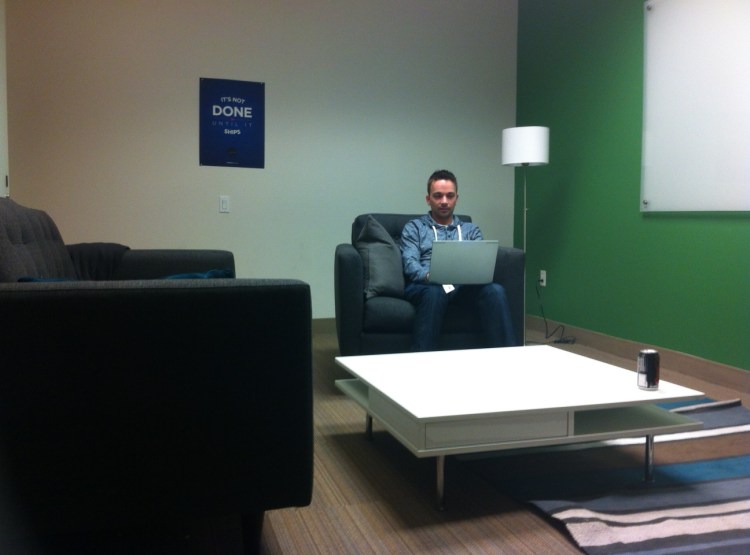For the past four months or so, Brad Rydzewski and Tom Burke the founders of startup Drone.io, have been busy.
The duo have rearchitected their cloud-based software, which automatically tests and deploys code to public clouds, to support the use of an increasingly popular open-source technology called Docker.
Docker can help developers package up their code in what’s known as a container and move that container from a desktop to a test environment and then to a live production environment without changing the code. The technology promises to help speed up the delivery of code.
“We saw that as kind of the future of virtualization,” Rydzewski said in an interview with VentureBeat.
But Rydzewski and Burke didn’t just want to use Docker as part of their own service. They decided to come out with whole new products that can help developers use Docker. They’ve been hard at work building the first of those products, which could help developers at big businesses approach the fast development cycle at web-scale companies like Facebook, Google, and Twitter.
Simultaneously, the Drone guys have been preparing to release much of the code behind their existing service — which developers have been paying for for more than a year — under an open-source license. And that’s happening today.
“We believe you MUST be open source to compete in this space,” Rydzewski told me via email. Companies like Ansible and Chef have released their services under open-source licenses, and loads of developers and IT operations people use them to deploy code frequently. Docker has done that, too. Now Drone is following suit, in an effort to get more developers on board.
The move could help Drone stand out more from competitors such as CloudBees, Codeship, Semaphore, and CircleCI, which just yesterday announced $6 million in new capital.
Drone seems to be doing something right. Public-cloud provider Rackspace seems to like the startup. Rydzewski and Burke get to work on the startup at Rackspace’s Geekdom coworking space in San Francisco.
“It’s very strategic for me to be working here, that’s for sure,” Rydzewski said. Currently the service runs on Amazon, but “we are moving to Rackspace,” he said.
And since Rydzewski gave a presentation on stage last month at the fifth demo day for the enterprise-focused Alchemist Accelerator, he and Burke have had to deal with lots of interest from investors, Rydzewski said.
For Drone, what will stay the same is the goal of turning the startup’s tools into must-haves for big IT shops, which increasingly want rapid access to scalable infrastructure and the ability to deploy new code many times a day.
Rydzewski and Burke are well acquainted with the technology needs of enterprises. For eight years they worked at GE, focusing mainly on developing payment processing and lending software.
Public-cloud products for application developers, like the Google App Engine and Amazon Web Services, intrigued Rydzewski. They were so easy to start using. “It’s so hard to innovate when it takes two weeks to get a server,” he said. He wondered why he and his colleagues at GE couldn’t use such services along with GE’s own data center infrastructure.
He had wanted to construct a Platform as a Service (PaaS) ever since trying out the Google App Engine, an early frontrunner in PaaS, at a Google I/O conference, he said.
With that idea in mind, he and Burke left GE in 2011. They interviewed for Y Combinator that year, along with Damian Eads, who’d worked on the startup idea with the duo. They didn’t make it in. They took a good, hard look at the world of software development aimed at deployments on cloud infrastructure. What needed improvement, they decided, was the process of building, testing, and deploying code — because that was too complicated and time-consuming.
“When we were building that product [the PaaS], we were spending, like, three hours a day deploying code, because the infrastructure was so complex,” Rydzewski said. “I was setting up this [open-source continuous-integration] tool called Jenkins, and it took us, like, three days to get it right. … That’s when I said we could … maybe try to build the next generation of this tool called Jenkins.”
They wanted it to be easy to consume as a cloud service, and at the same time, it needed to be reliable enough that developers at enterprises would readily use it.
The continuous-integration product they built has been running in production for over a year, with revenues coming from monthly subscriptions. More than 5,000 developers use the service, tying it to the site where they store code — like GitHub, for example — and the cloud of their choice. That option will remain available, and it will integrate closely with the new Docker-oriented services Drone will launch in the coming months.
Drone’s interest in taking advantage of Docker appealed to the Alchemist Accelerator’s decision committee and helped the startup secure funding from the accelerator, Alchemist’s head, Ravi Belani, told VentureBeat via email.
“Way back when we admitted Drone, they were thinking very creatively about leveraging Docker and were asking themselves, ‘What can we do with Docker that we couldn’t do before?'” Belani wrote. “They are reinventing for a world where Docker containers rule virtualization. This is what got us excited.”
Perhaps Drone’s existing and forthcoming technology will become more deeply integrated into Rackspace’s cloud offering as the company looks to grow its market share in a competitive industry. Perhaps Rackspace will even acquire Drone. No matter what happens, though, you can derive a lesson from the change Drone is undergoing: Companies want to deliver software to clouds as fast and as often as they can, and in the future, Docker’s containers could become an essential part of that process.


